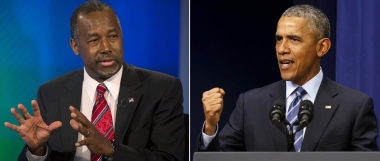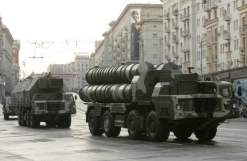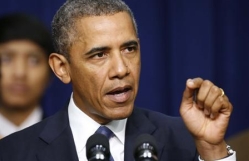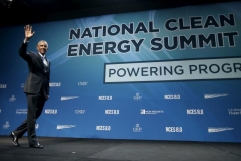The White House's lobbying for the Iran nuclear deal has gained another supporter with Delaware Sen. Thomas Carper coming out to pledge his support. He is the 30th Senate Democrat to express his backing for the deal, which the Obama administration contends will prevent Iran from acquiring a nuclear weapon.
However, a solid front of Republican lawmakers in both houses of Congress and about 200 former top military officials are saying the opposite—that the deal will greatly boost Iran's capability to produce a weapon of mass destruction.
President Barack Obama thus moved a step closer to gaining enough support for the deal, reports said.
Obama needs 34 votes in the Senate to prevent an override of his veto once the deal is rejected. The 30 senators who support the deal are all Democrats and independents who vote with Democrats.
"America and our five negotiating partners – Great Britain, France, Germany, Russia and China – have reached an historic agreement with Iran to end their pursuit of nuclear weapons for years and, maybe, forever," said Carper, according to an opinion column he wrote for The News Journal of Delaware. "The deal provides Iran an opportunity to rebuild its economy and shed the pariah status it's borne for decades, a status that belies the culture and history of that nation."
Senate Democrat Chris Coons, also from Delaware, will announce his decision on the Iran deal on Sept. 1 at the University of Delaware in Newark.
Democratic National Committee Chairwoman Debbie Wasserman Schultz, who is a representative from Florida, is still undecided on the deal, reported The Atlantic.
The US Congress will vote on the resolution of disapproval about the Iran deal on Sept. 17, a week after Congress resumes session and begins debate on the Republican-sponsored resolution.
Republicans must have 60 votes in the Senate to move the resolution forward under the rules. They will need a simple majority of 51 votes to approve the resolution.
With the US Senate under the control of Republicans, the measure is expected to pass.
The Republican-controlled House is also expected to easily pass the resolution as Republicans hold 246 of the 435 seats.
If both houses approve the resolution, it will be transmitted to Obama's desk. He earlier said he would veto it.
If the President vetoes it, opponents of the deal will try to override it by a two-thirds majority vote in each chamber.
Democrats could block the override in the Senate with 34 votes and, so far, 30 have come out supporting the Iran deal.
In the House, if Republicans voted against the deal, they need at least 44 Democrats to vote with them to override the President's veto.
The Iran deal is not a treaty; hence, a two-thirds vote is not needed in the Senate to ratify it. The resolution of disapproval was included in a law signed by the President last May that gave Congress the right to assess the deal.
If Congress successfully overrides the veto, President Obama would be prohibited from waiving most of the US sanctions against Iran regarding its nuclear programme, which some analysts say will effectively kill the deal.





















